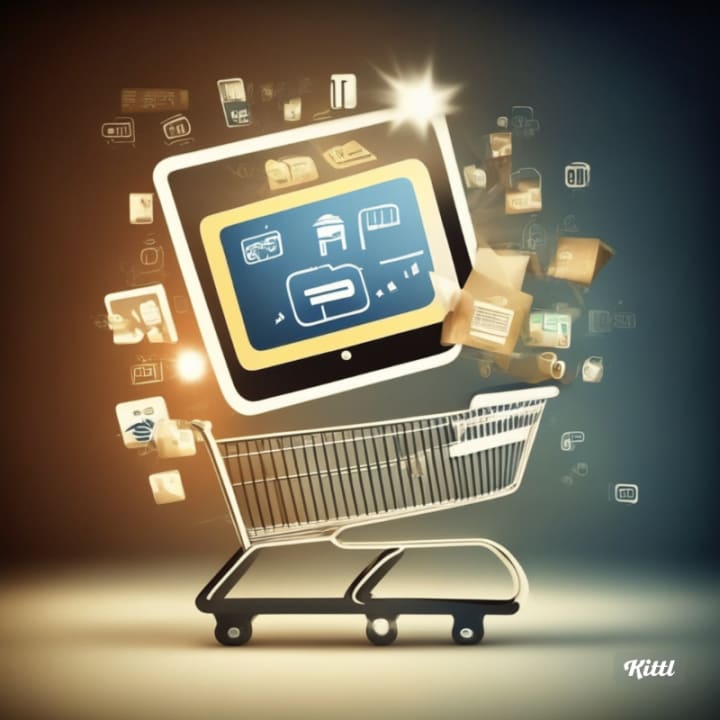e-commerce in marketing
"Why E-Commerce is the Future of Marketing: Exploring the Advantages and Opportunities of Online Shopping"

E-commerce has rapidly become an integral part of modern business, and it is clear that it will continue to shape the future of commerce. In this article, we will explore why e-commerce is the future of marketing.
Take your email marketing campaigns to the next level with our powerful automation software here

Firstly, e-commerce has become the preferred shopping method of many consumers. With the rise of technology and the internet, consumers can now shop from the comfort of their own homes, at any time of the day or night. This convenience factor is a huge driver of e-commerce growth, particularly in the current global climate, where many people are still hesitant to enter physical stores due to the ongoing pandemic.
Furthermore, e-commerce offers a range of benefits that traditional brick-and-mortar stores cannot match. For example, e-commerce stores can offer a much wider product selection, as they are not limited by physical shelf space. This means that consumers can find niche products that they may not have been able to find in a physical store. Additionally, e-commerce stores can offer competitive prices due to lower overhead costs, which can be passed on to the consumer. This is particularly important for price-sensitive consumers who are looking for the best deal.
Take your email marketing campaigns to the next level with our powerful automation software here

Another key advantage of e-commerce is the ability to collect and analyze data on consumer behavior. E-commerce platforms can track user behavior, such as which products they view, how long they spend on a particular page, and what they ultimately purchase. This data can be used to personalize the shopping experience for each individual customer, through targeted product recommendations and personalized marketing campaigns. This level of personalization is difficult to achieve in a physical store, where it is much harder to track consumer behavior.
Moreover, e-commerce has opened up new marketing channels that were not possible before. Social media platforms, for example, have become important marketing channels for e-commerce stores, as they allow businesses to reach a large audience at a relatively low cost. Social media platforms also allow businesses to engage with their customers in real-time, providing a more personalized and interactive experience.
Take your email marketing campaigns to the next level with our powerful automation software here

In addition to social media, e-commerce stores can leverage other digital marketing channels such as email marketing, search engine optimization (SEO), and pay-per-click (PPC) advertising. These channels can be highly targeted, allowing businesses to reach specific customer segments with tailored messaging.
E-commerce also offers a range of tools and technologies that can help businesses optimize their marketing efforts. For example, A/B testing allows businesses to test different versions of their website or marketing campaigns to determine which performs best. This data-driven approach to marketing can help businesses make informed decisions about their marketing strategies and optimize their campaigns for maximum impact.
Take your email marketing campaigns to the next level with our powerful automation software here

Furthermore, e-commerce platforms offer a range of analytics and reporting tools that can help businesses track their marketing performance and identify areas for improvement. For example, businesses can track metrics such as conversion rates, click-through rates, and customer lifetime value to gain insights into their customers' behavior and the effectiveness of their marketing campaigns.
Another advantage of e-commerce is the ability to target customers globally. With the internet, businesses can reach customers in different countries and regions, expanding their customer base and sales potential. This global reach can also help businesses diversify their revenue streams and reduce their reliance on a single market.
Take your email marketing campaigns to the next level with our powerful automation software here

Finally, e-commerce has become increasingly accessible to small businesses. With the rise of e-commerce platforms such as Shopify and WooCommerce, businesses of all sizes can easily set up an online store and start selling to customers around the world. This has democratized commerce, allowing small businesses to compete with larger, established brands.
Take your email marketing campaigns to the next level with our powerful automation software here
In conclusion, e-commerce is the future of marketing. Its convenience, personalization, and data-driven approach make it an attractive option for both businesses and consumers. E-commerce offers a range of advantages over traditional brick-and-mortar stores, including a wider product selection, competitive prices, and the ability to collect and analyze data on consumer behavior. It also offers a range of digital marketing channels and tools that can help businesses reach and engage with customers in new and innovative ways. As more businesses embrace e-commerce, it is clear that it will continue to shape the future of commerce for years to come.





Comments
There are no comments for this story
Be the first to respond and start the conversation.